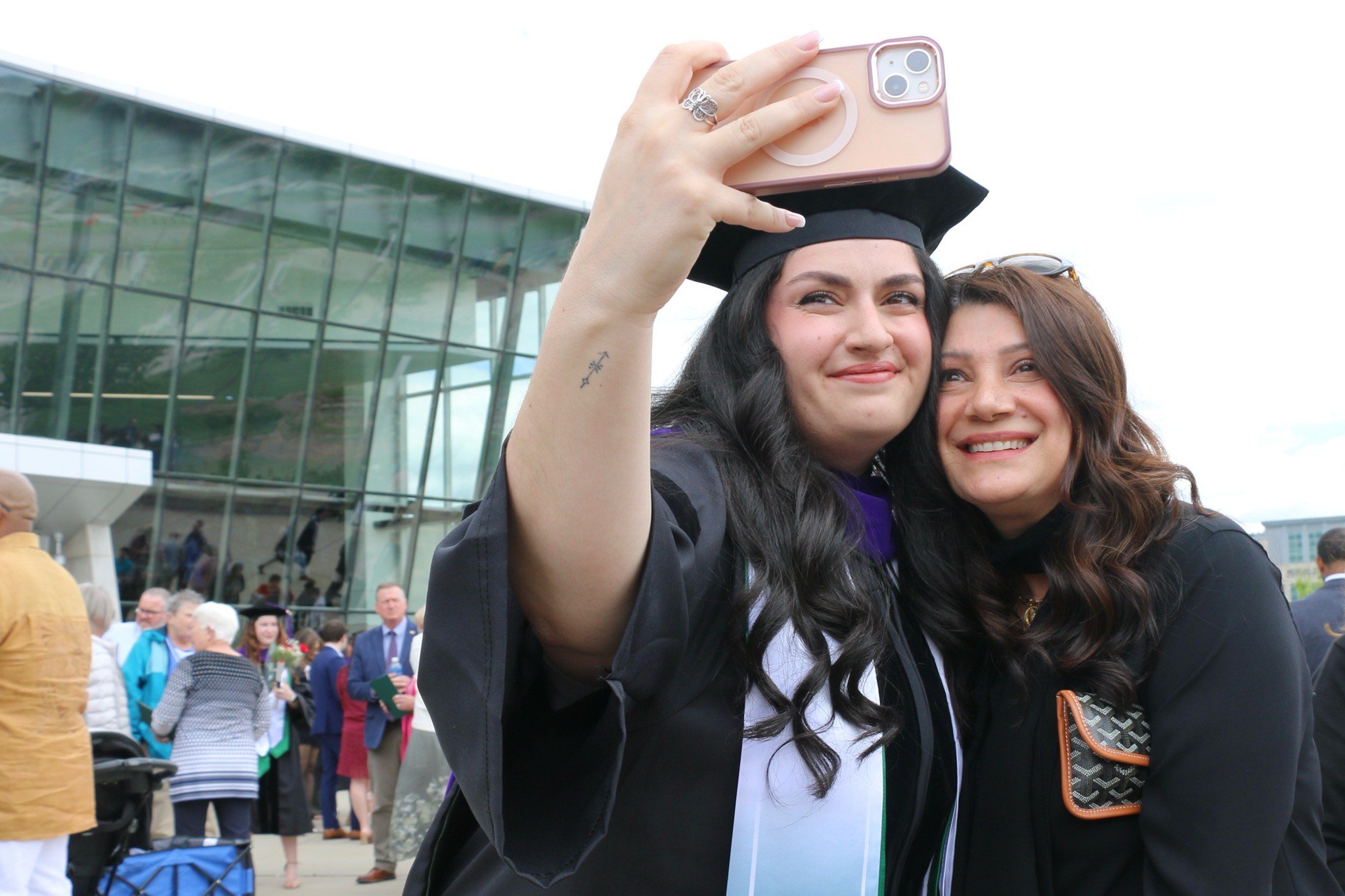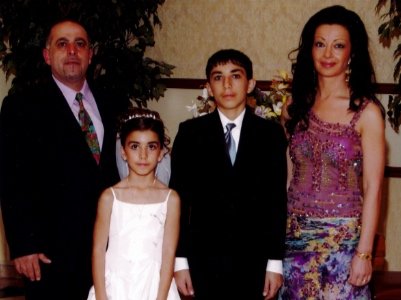Feminine Identity



What does it mean to be a Chaldean woman?
By Jenna Abroo
Society is now experiencing the fourth wave of modern-day feminism here in the West, and many of us are becoming more aware of what contributes to our identities as women. In my own experience, one of the main influences on my identity as a woman/feminist was my Chaldean family/culture.
I am proud of my rich lineage and thankful for the “village” who helped raise me, like my Bebe Badia and my Amma Yasar. I am always curious to see if other women in our community feel the same way, and how our culture has shaped how they view themselves. I had the wonderful opportunity to interview four different Chaldean women, of all different backgrounds. While our conversations varied; it seemed that every conversation found its way back to one core question: In your experience, what does it mean to be a Chaldean woman?
My first interview was with May Asmar (56), a married mother of two who is a Family Resource Assistant for Warren Consolidated Schools. Asmar stated that although it is not easy to be a woman, she is proud to be one—especially a mother. When discussing what advice she would give to empower young Chaldean women, she says, “Be confident, don’t waste opportunities, listen actively around you, and don’t be afraid of your own shadow.”
Asmar graduated from Wayne State University in 1994 with her undergraduate degree in Criminal Justice/Political Science. She asserts that this is one of her biggest sources of confidence, especially being raised with the community mindset that education is not a necessity for women since they end up “getting married and having kids.” Having a degree made her feel “whole,” and while she didn’t have a lot of support in this decision, she is grateful to have put in the hard work and for this accomplishment.
When asked if her feminine identity would be different if she weren’t Chaldean, Asmar beautifully states that our traditions, faith, and heritage shape all of us, and that she actively shares these values with her children, especially her daughter. One thing that she would like to see progress in our community is more attention towards our special needs children and to break the stigma of supporting our community members who have disabilities.
Julia Alexander (26) is an Immigrant Justice Corps Fellow working as a Staff Attorney at Michigan Immigrant Rights Center. She explained that she deeply resonates with Chaldean women, and views them as “the center and heroes of our community.” Alexander has always considered herself an empowered feminist and accredits this belief system to her mother/grandmother who raised her. At age 18, she became politically and civically engaged in her community, advocating for women’s health laws and voter engagement. After completing her undergraduate degree at Oakland University, she began volunteering with non-partisan projects while attending law school at Michigan State University, where she graduated in 2024.
Alexander confirmed her family had been matriarchal; her grandmother and mother were both widowed young and had to raise their children alone. Alexander feels blessed to have been brought up by the “village” of her family, believing “God has a plan, and he planned for me to grow up surrounded by women.”
Her mother, aunts and sisters fiercely encouraged her to succeed in education, to challenge stereotypical gender roles, and to be a voice of advocacy for others. She warmly calls her godmother her “North Star;” she is one of Alexander’s biggest role models for faith, resilience, and female empowerment. Concluding that being a Chaldean woman is to be “a woman of God,” she hopes other Chaldean women will uplift each other more in our communities.
Amy Joa (40) is the Higher Education Administrator/Associate Director of the Executive MBA at Michigan State University. She is a married mother of two and expresses that her Chaldean identity is directly connected to her feminine identity of strength, grace and beauty.
Joa said that her identity as a Chaldean woman was altered by living in Western society; while she welcomes/respects traditions from our culture, there were also times where she challenged them. Her parents supported her decision to go away to college at Michigan State, which has never been the norm for Chaldean women.
She encourages young Chaldean women to “empower themselves to pursue their passions, even if it isn’t something that is traditionally expected or accessible.” Joa credits her grandmothers, aunts and cousins, who were “wonderful influences in my upbringing and modeled what it meant to show up for one another during the good times and bad.”
We often see a double standard with men and women in our community, and Joa keeps this in mind while raising her son and daughter. She encourages them equally to pursue their passions in any setting. She shared with her first memory of being aware of her femininity when visiting family in Baghdad in 1988. She begged to play the same way she did back in the U.S.—wearing pants, hair in a ponytail, and playing rough in soccer with the boys outside. She felt lucky that her mom allowed her to be that authentic version of herself, and she strives to do this with her daughter. Joa hopes that the community can evolve to “celebrate feminism/femininity in all forms as we honor our traditions and move forward towards equality and opportunity.”
Maryam Qoda (21) is a Medical Assistant/Student at the University of Detroit Mercy. Her identity as a woman rests in fighting for equality and empowerment for all women, “including the unique struggles we face as Assyrian women.” She has always considered herself to be a social justice advocate and even founded a women’s rights organization, “The Feminist Coalition” on her college campus. She states that the work has “allowed me to connect with other women who share my passion and has created a supportive space on campus for empowerment.”
Qoda explains that the significance of preserving our language, traditions, and religious practices is something she always defends when speaking to non-Chaldeans. She credits her Teta Tahani for teaching her the importance of accountability and setting boundaries while also maintaining compassion and empathy. Her Teta, “created a space where I could grow into my identity without feeling like I had to choose between nurturing and being assertive. Both aspects are beautiful and powerful, and I carry that lesson with me as I navigate my own life.”
Qoda has big wishes for the progress of our community, in the U.S. and in Iraq. She hopes for better education and workforce opportunities, and support in STEM fields. Success to her is all about “being authentic, having courage to pursue what fulfills you, and using your platform to empower other women to do the same for future generations. That they too can achieve their dreams and create meaningful change.”
Throughout these interviews, all these incredible women relate to their culture and their femininity in their own ways. One thing seems to ring true for all—they empower and strengthen themselves and other women around them, utilizing the rich upbringing of our Chaldean heritage, culture, and community to fuel the fire of their unwavering feminine identities.
photo courtesy of Amy Joa
Top of page: 4 generations: Amy Joa’s maternal grandmother Mary, her mother Hayfa with herself and her daughter Amelia at a bridal shower in 2024. Above: Julia Alexander and her godmother Hanna Cushing at MSU’s Law School graduation, 2024.
May Asmar with her husband and their two children at their First Holy Communion, 2008.
